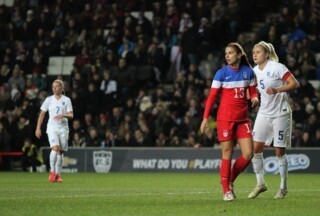Forget Steve, Think Steph
Natasha Chahal
This time last summer I knew exactly where my friends would be, each evening showing blind and unwavering affection for football – men’s football. This summer I’ve had to coerce and cajole, offering positive reinforcement to those who bothered to watch games. This is the difference between Russia 2018 and France 2019. It may appear insignificant, but it reflects the difference between the perception of men and women both on and off the pitch. After matches, I’ve spent evenings scrolling social media to relive the excitement and been met with stale comments to the effect that ‘no one cares about women’s football.’ What they mean is they don’t care about women and they don’t care about their strength and their prowess and the way Steph Houghton has become the new poster girl for Steve McQueen-type cool and composure. And they don’t care that generations of girls and women feel able for the first time to be aggressively unapologetic about their talents.
Last night England took on its toughest opponents, the USA. It’s been a mixed bag for the US women’s team. They were both criticised and praised for their goal celebrations against Thailand, in a game which resulted in a 13-0 thrashing. But by the end of the tournament everyone will have heard the name Megan Rapinoe, not least for her outspoken critique of the Trump presidency. Contrast this with England’s Lionesses, the nation’s sweethearts. In an impassioned post-game review after England’s 3-0 defeat of Cameroon – which involved elbows, spitting and a refusal to restart the match by the other side – the England manager, Phil Neville said: ‘I didn't enjoy it, the players didn't enjoy it and my players kept their concentration, but those images are going out worldwide and young girls are seeing that behaviour and it's not right.’ Cameroon were seen as being entirely in the wrong, England entirely in the right. This is the football’s central narrative: we play fair, they don’t.
Last week Sadiq Khan announced on Twitter that, in partnership with Wandsworth Council, he had sanctioned an outdoor screening of the England-USA match in Battersea Park. Around 1500 people sat on the grass to watch the game with an atmosphere more suited to the tennis: all very English, with little more than ‘ooohs’ and ‘aaahs’, so far from the murky aggression that often accompanies men’s football. This isn’t uncommon at women’s games, where there’s a degree of support for both teams. It’s much easier to shout abuse at men. Maybe it’s the patriarchy, maybe it’s the salaries, maybe it's the bloated egos and the time spent wasted rolling around on the grass complaining. Even when you loathe the opposition there’s still admiration for any woman playing at a competitive level.
Within nine minutes the USA had taken the lead; ten minutes later England equalised. The USA scored again and England had a near miss – with VAR confirming that our chance was offside. It was all over for England. In Battersea, the veneer of politeness evaporated, making way for rebellion. Beers were thrown, talk turned to politics, park pundits named every cruel and unfair act we’ve seen from the USA over the past hundred years. ‘America aren’t playing that well and still we are afraid of them,’ one fan commented online – pretty much the view of Theresa May's government and most British governments before it. Football had reverted to being the game that I know and to a certain degree, secretly love. There was no thought to being gracious in defeat: our girls were rattled, and the shouts got louder. Even Steph Houghton lost her cool, missing a penalty that had no hope of ever meeting the goal. Her face afterwards, an image etched into my memory, sits with David Beckham’s petulant kick at Diego Simeone in the 1998 World Cup. But unlike Beckham in his moment of disgrace, she went straight back into the game, at full speed and pace, not allowing herself any time to waste. I’ll never forget it.

Comments
If that doesn't guarantee her place in the annals of English football, nothing will.